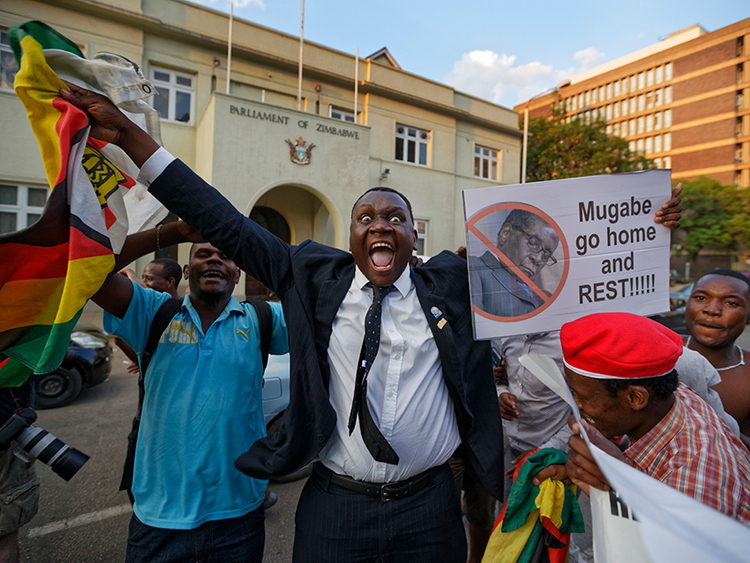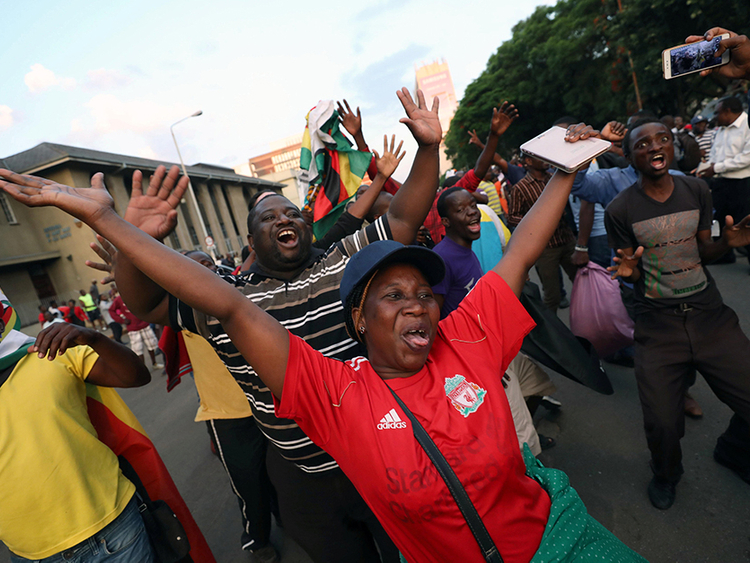Harare: Car horns blared and cheering crowds raced through the streets of the Zimbabwean capital Harare on Tuesday as news spread that President Robert Mugabe, 93, had resigned after 37 years in power.
"We are just so happy that things are finally going to change," said Togo Ndhlalambi, 32, a hairdresser. "We woke up every morning waiting for this day. This country has been through tough times."
Mugabe's resignation was announced by parliament speaker Jacob Mudenda on Tuesday. Mugabe, who was the world's oldest head of state, said in his letter that legal procedures should be followed to install a new president "no later than tomorrow."
"I Robert Gabriel Mugabe in terms of section 96 of the constitution of Zimbabwe hereby formally tender my resignation... with immediate effect," said speaker Mudenda, reading the letter.
"My decision to resign is voluntary on my part and arises from my concern for the welfare of the people of Zimbabwe and my desire for a smooth, non-violent transfer of power," Mugabe said in the message read out by Mudenda.
Mnangagwa to take over
Recently fired Vice President Emmerson Mnangagwa would take over as the country's leader within 48 hours, said a ruling party official, Lovemore Matuke. Mnangagwa, who fled the country after his firing on November 6, "is not far from here," Matuke said.
Mugabe can participate in a formal handover of power "so that Mnangagwa moves with speed to work for the country," Matuke said.
The bombshell news of Mugabe's resignation was delivered to a special joint session of parliament.

Zimbabwe's members of parliament celebrate after Mugabe's resignation on November 21, 2017 in Harare.
Lawmakers had convened to debate a motion to impeach Mugabe, who has dominated every aspect of Zimbabwean public life since independence in 1980.
Mugabe's resignation brought an end to impeachment proceedings brought by the ruling Zanu-PF party after its Central Committee voted to oust the president as party leader and replace him with Mnangagwa, a former ally of Mugabe who served for decades as his enforcer with a reputation for being astute and ruthless, more feared than popular
Jubilation on the streets
News of Mugabe's resignation was greeted on the streets of the capital Harare with car horns and wild cheering.
It capped an unprecedented week in which the military seized control, tens of thousands of Zimbabwean citizens took to the streets to demand the president go and 93-year-old Mugabe wrestled to remain in power.
Mugabe had ruled Zimbabwe almost unopposed since the country won independence from Britain.
But his efforts to position his wife Grace as his successor triggered fury in the military that had underpinned his regime.
A look at Mugabe's long rule
Here is a look at Mugabe's more than three decades in power.
1980: Mugabe named prime minister after independence elections
1982: Military action begins in Matabeleland against perceived uprising" government is accused of killing thousands of civilians
1987: Mugabe changes constitution and becomes president
1994: Mugabe receives honorary British knighthood
2000: Land seizures of white-owned farms begin" Western donors cut off aid
2005: United States calls Zimbabwe an "outpost of tyranny"
2008: Mugabe and opposition candidate Morgan Tsvangirayi agree to share power after contested election" Britain's Queen Elizabeth II annuls Mugabe's honorary knighthood
2011: Prime Minister Tsvangirayi declares power-sharing a failure amid violence
2013: Mugabe wins seventh term" opposition alleges election fraud
2016: #ThisFlag protest movement emerges" independence war veterans turn on Mugabe, calling him "dictatorial"
2017: Mugabe begins campaigning for 2018 elections
November 6: Mugabe fires deputy Emmerson Mnangagwa, appearing to position first lady Grace Mugabe for vice president post
November 15: Army announces it has Mugabe and his wife in custody as military appears to take control
November 18: Tens of thousands of Zimbabweans march against Mugabe
November 19: Ruling party Central Committee tells Mugabe to resign as president by noon Monday or face impeachment. He addresses the nation but does not step aside
November 21: Mugabe resigns shortly after Parliament begins impeachment proceedings.














